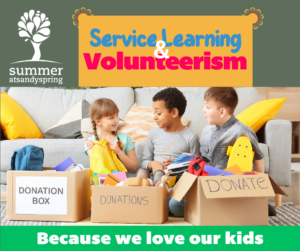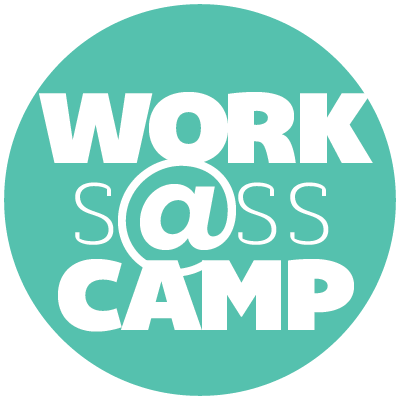Service Learning & Volunteerism
Another increasingly relevant factor for our campers’ growth and future

In our “Because We Love Our Kids” series we have touched on a variety of factors and areas of emphasis that help our campers internally and on their own personal paths. Today’s article touches on another increasingly relevant factor for our campers’ growth and future; service learning and volunteerism. It is exceedingly important that children in today’s society learn how to look outward and give back. Summer at Sandy Springs participants, whether they are little ones, children, or teenagers, all learn the value of this concept during their time with us in the summer.
The littlest ones in our camps, our Little Friends and Junior Friends, learn to care for the environment and demonstrate reciprocity with peers by participating in daily clean-up and taking care of each other. As our Friends grow in age and maturity, the expectation of giving back also grows. By the time our campers reach the age of 14, they’re expected to participate in official Student Service Learning credits (a total of 75) to achieve their high school diploma in the state of Maryland. However, students can start earning these credits as early as fifth grade (and bonus, just one week of volunteering when age 14+ at SaSS earns forty of those credits)!
Service learning is defined by the state of Maryland as “a credit-bearing educational experience in which students participate in an organized service activity that meets community needs and then reflects on the service activity in such a way as to gain further understanding of course content, a broader appreciation of the discipline, and an enhanced sense of civic responsibility.”
The definition of service learning is expansive because of how many outcomes it affects. Qualitative research indicates that service-learning achieves outcomes including increased personal efficacy, awareness of the world, understanding of one’s values, as well as increased engagement in the classroom experience.
Life skills, such as interpersonal skills, leadership ability, social confidence and self-awareness, and conflict resolution skills are all positively impacted. Service learning and volunteerism increase tolerance and complexity of thought and provide students with experience with real-life consequences of their actions. All of these factors are necessary to produce a well-rounded adult.
Participation in service has also shown significant positive effects on academic performance, such as grade point average (GPA), writing skills, and critical thinking skills, and has beneficial consequences as students reach college, including an increased likelihood of retention and degree completion, graduate degree aspiration, and increased college GPA. Even if a child does not eventually pursue college (which we know isn’t right for everyone), the expectation in today’s work culture is that employees have civic responsibilities and participate in volunteerism.
According to research in this domain, service participation may have the strongest effect on a student’s future decision to pursue a service-oriented career. For example, evidence indicates that those who are passionate about the areas of civic responsibility they focus on, their “passion projects,” are more likely to pursue careers in service. Perhaps your child is a future teacher who learns skills as a volunteer counselor at SaSS; perhaps they’re a future diplomat! Whether your kiddo is just starting their journey with us or nearing the end of their camper experience, Summer at Sandy Springs provides a variety of experiences and opportunities to expand their mindset, experience the joy of giving back to others, and grow as a person.





